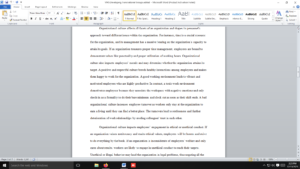Interpersonal Relationships in Transnational
Use the assigned chapters and the “Interpersonal Relationships in Transnational, Virtual Teams: Towards a Configurational Perspective” article located on this week’s University Library Resources page to complete this assignment.
Read the following case study scenario:
In a recent merger, two companies combined; one company was located in the United States, and the other company was located in Japan. Although both companies are now a unified business organization, offices will be kept in both countries. Because of this merger, transnational groups are now being formed with employees from the United States and from Japan.
Write a 1,050- to 1,400-word paper that addresses the following:
- Define organizational culture, and discuss how an organization’s culture can affect its members.
- How might individualism and collectivism affect the functioning of the new transnational work groups in this scenario?
- Discuss strategies that can help transnational work groups be successful and effective when meeting face to face.
- Because transnational work groups will generally work virtually, discuss strategies focused on helping virtual, transnational work groups be successful and effective.
Format your paper consistent with APA guidelines.
Answer preview
An organization tends to embody the dominant culture within its sphere of operation. The merger is more complicated considering the significant cultural differences between Japan and the US. One such dichotomy arises between individualism and collectivism. An individualist culture values a person’s contribution and well-being over the group, while a collectivist culture entails prioritizing the group even at the expense of personal comfort (Wagner, Humphrey, Meyer, & Hollenbeck, 2012). Individualism may encourage the generation of more ideas as people will be encouraged to think independently and assert themselves more often. Individualism also yields better self-reliance tendencies within the group. On the negative side, individualism may undermine cohesion as people are in constant competition even when it is best for them to work together.
[1247 Words]

Interpersonal Relationships in Transnational

